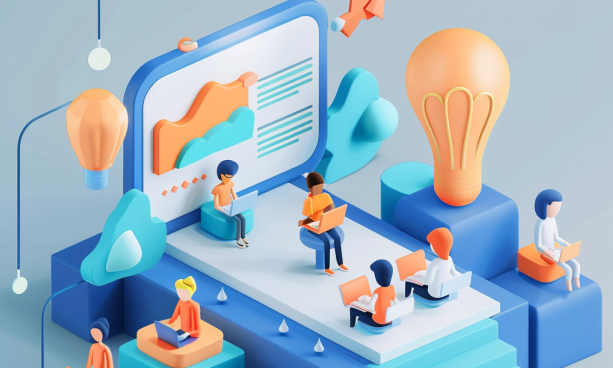In today’s rapidly evolving digital landscape, educational technology has become a cornerstone for personal development and organisational growth. Among the plethora of tools available, Learning Management Systems (LMS) and Learning Experience Platforms (LXP) stand out. However, distinguishing between the two and understanding which platform suits your needs can be challenging.
This article demystifies LMS and LXP, highlighting their key differences and guiding you on choosing the right platform.
What is a Learning Management System (LMS)?
A Learning Management System (LMS) is a software application or web-based technology used to plan, implement, and assess a specific learning process. LMSs are traditionally used in educational institutions and corporate settings to deliver educational courses or training programs. They allow for the creation, distribution, and management of course content, monitoring student participation, and assessing student performance. Popular LMS features include course management, user registration, progress tracking, and reporting.
Typically the focus of an LMS is on directive learning.
What is a Learning Experience Platform (LXP)?
Learning Experience Platforms (LXP) are a newer innovation focused on delivering a personalised learning experience. LXPs leverage AI and machine learning to provide curated content recommendations based on users’ interests, job roles, and learning behaviour. Unlike traditional LMSs, LXPs offer a more user-centric approach, emphasising self-directed learning and knowledge discovery. Key features include content aggregation from multiple sources, social learning capabilities, and a focus on informal learning paths.
Typically the focus of an LXP is on self-driven learning.
What is a Talent Experience Platform (TXP)?
A Talent Experience Platform (TXP) is an advanced solution designed to enhance the entire employee journey within an organisation, from onboarding to development and retention. By integrating AI and machine learning, TXPs offer personalised career development paths and insights tailored to each employee's skills, aspirations, and performance data. Unlike traditional HR systems, TXPs place a strong emphasis on the employee experience, fostering a culture of continuous growth and engagement.
Key features of a TXP include comprehensive talent management tools, such as skills assessments, career pathing, and succession planning, coupled with real-time feedback and recognition functionalities. This holistic approach ensures that employees feel valued and supported, driving higher satisfaction and productivity.
Typically the focus of a TXP is on balancing both directive and self-driven learning
Key Differences Between LMS, LXP and TXP
- Focus: LMSs prioritize managing and delivering structured learning content, focusing on compliance and formal training. LXPs, on the other hand, enhance the learning experience with a user-centric approach, emphasizing self-directed and informal learning. TXPs go beyond learning to improve the entire employee lifecycle, integrating career development, performance management, and engagement within a unified platform.
- Content Delivery: LMSs provide a catalog of formal courses and materials, focusing on specific learning outcomes. LXPs offer a wider range of content, including external and user-generated resources, personalized through AI to fit individual preferences. TXPs combine learning with career development tools, offering a comprehensive suite of resources for professional growth.
- Learning Path: LMSs offer a linear, predefined learning journey, whereas LXPs allow for a more flexible, interest-based exploration of content. TXPs extend this flexibility to career development, guiding employees through personalized growth paths aligned with organizational goals.
- Interactivity and Engagement: LMSs generally limit interaction to course completions, while LXPs foster a collaborative learning environment with social features and gamification. TXPs enhance engagement by linking learning to broader aspects of the employee experience, including performance feedback and recognition, to build a supportive organizational culture.
Choosing the Right Platform
Selecting the right platform—be it an LMS, LXP, or TXP—depends on your organization's broader goals and the specific needs of your workforce. For those prioritizing structured training, compliance, and assessments, an LMS may be the optimal solution. On the other hand, an LXP would be ideal for promoting continuous learning and personal development through a more flexible and personalized approach. If your aim extends beyond learning to encompass a holistic view of employee experience, including career development, performance management, and engagement, then a TXP might be the most comprehensive choice, aligning with both individual aspirations and organizational objectives.
.png?width=224&height=285&name=New%20L%26D%20Platform%20(1).png)
|
Learn Amp: Aligning people towards success in a 'People Development Hub'
Learn Amp elevates the concept of talent development by redefining itself not just as a platform but as a 'People Development Hub,' effectively acting as an enhanced version of a Talent Experience Platform (TXP) that seamlessly integrates the strengths of both Learning Management Systems (LMS) and Learning Experience Platforms (LXP).
This advanced hybrid approach allows Learn Amp to offer a comprehensive solution that transcends traditional platforms by combining the rigorous, structured learning management and compliance capabilities of an LMS with the flexible, personalized, and engaging learning experiences facilitated by an LXP. Moreover, it extends beyond the functionalities of a typical TXP by focusing not only on the holistic aspects of the employee lifecycle but also on cultivating a culture of continuous learning and development at its core.
What sets Learn Amp apart and makes it superior in the context of a 'People Development Hub' is its ability to align the varied learning and development needs of an organisation with the personal growth aspirations of its employees. It does so by fostering an environment that encourages self-directed learning, personal development, and collaborative knowledge sharing, while also ensuring compliance and meeting formal training requirements. This dual focus ensures that employees are not just compliant but are also engaged, motivated, and aligned with the organisational goals, thus driving success for both the individual and the business.
Learn Amp's strength lies in its versatility and its capacity to provide a unified, cohesive learning journey that integrates the structural benefits of an LMS, the dynamic and personalised learning experience of an LXP, and the holistic employee development focus of a TXP. By doing so, it positions itself as a more comprehensive solution for today's complex and diverse learning ecosystem, making it a preferred choice for organisations aiming to foster a culture of continuous improvement and align their people towards success.
If you're keen to find out more, request a demo below!



